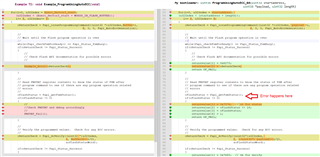Other Parts Discussed in Thread: TMS320F280025, , UNIFLASH, C2000WARE
I have a problem with some TMS320F280021 as well as some TMS320F280025. I have a program that connects over JTAG to the chip, and then downloads a bootloader to program data into it. For some devices everything is working fine, but some always fail while programming.
I tried to program the devices with UNIFLASH and our XDS110 DEBUG PROBE, there everything was working well, so the Chips are not broken.
I tried to erase the device multiple times before the writing, or erase with UNIFLASH before writing with our program. In all cases the blankcheck was successfull, but the programming failed at the same address.
I tried to add a waiting time between each 64 bit write, this did not affect the programming and they failed at the same address as always.
The error is that the FMSTAT is not zero after the programming call, the bits 12 & 4 are set.
PGV [12]: Program verify. When set, indicates that a word is not successfully programmed after the maximum allowed number of program pulses are given for program operation
CSTAT [4]: Command Status. Once the FSM starts any failure will set this bit. When set, this bit informs the host that the program or erase command failed and the command was stopped. This bit is cleared by the Clear Status command. For some errors, this will be the only indication of an FSM error because the cause does not fall within the other error bit types.
I checked tha Flash API reference guide, but there I found nothing that would explain this behavior.
Is there anything else that I can try, or does anyone have an Idea what could cause this?


